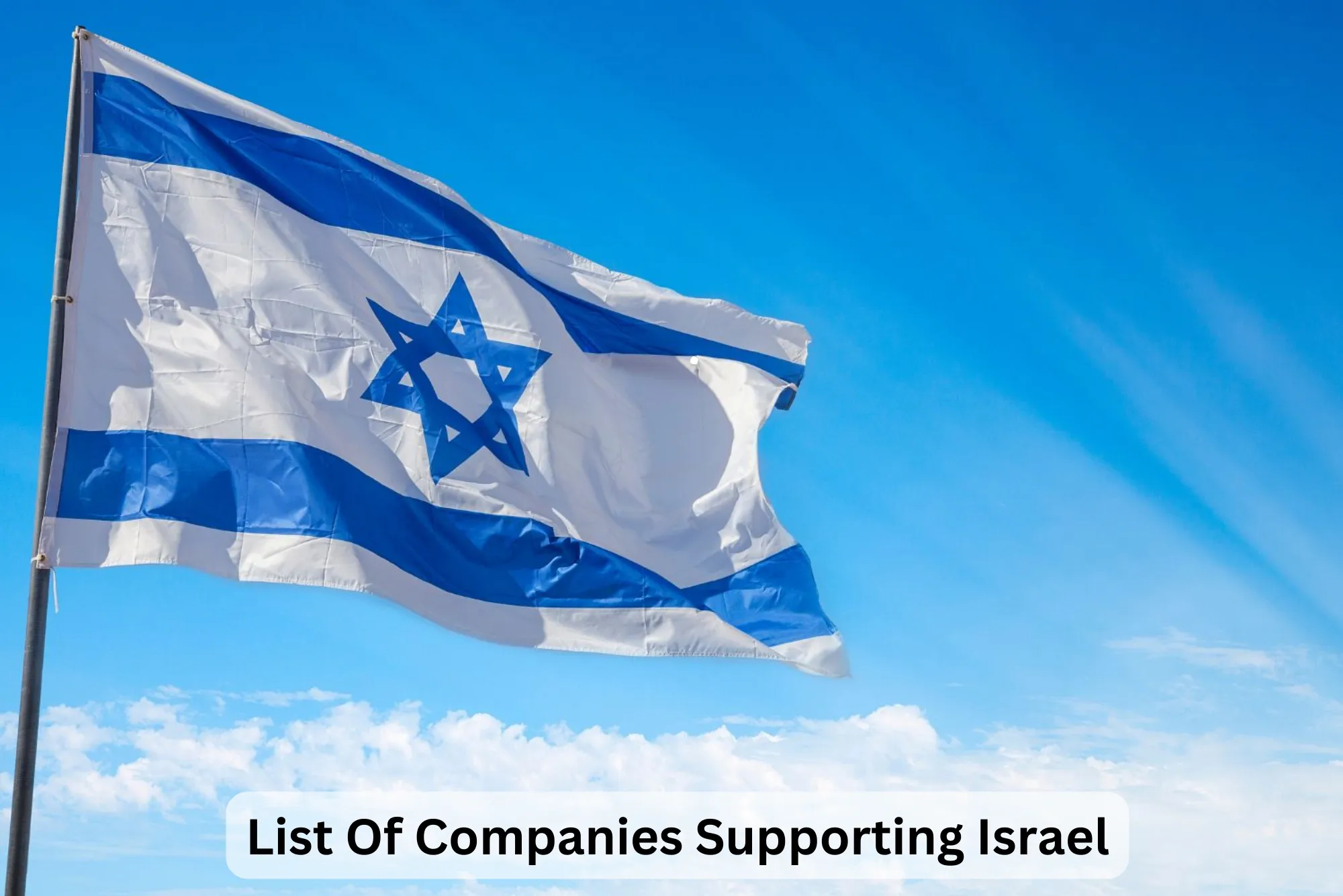In the intricate landscape of geopolitics, the role of corporations often extends far beyond the confines of boardrooms and profit margins. Nowhere is this more evident than in the case of Israel, a nation entangled in a complex web of regional tensions and international relations.
The support of corporations for Israel carries significant economic, political, and ethical implications, shaping not only the nation’s trajectory but also the global perception of its policies and actions.
Why Companies Support Israel
The motivations behind companies‘ support for Israel are multifaceted and rooted in various strategic considerations:
Economic Opportunities:
Israel boasts a vibrant economy with a strong emphasis on innovation and technology. Companies are drawn to its dynamic startup ecosystem and highly skilled workforce, seeing it as a lucrative market ripe with opportunities for growth and investment.
The country’s GDP growth has consistently outpaced many developed nations, making it an attractive destination for foreign investment.
Technological Innovation:
Israel has earned the moniker “Startup Nation” for its prowess in technological advancements across various sectors, including cybersecurity, biotechnology, and artificial intelligence. Many global corporations seek to tap into this innovation hub through partnerships, research collaborations, and acquisitions.
Israeli startups are renowned for their disruptive technologies and entrepreneurial spirit, attracting investments from Silicon Valley giants and multinational corporations.
Strategic Alliances:
Beyond economic incentives, companies often forge partnerships with Israel for strategic reasons, leveraging its geopolitical position as a gateway to markets in the Middle East and beyond.
Additionally, Israel’s close ties with Western powers, particularly the United States, make it an attractive ally for corporations seeking to bolster their geopolitical influence.
The strategic alliance between Israel and the U.S. is reinforced by military cooperation, intelligence sharing, and diplomatic support, creating a conducive environment for business partnerships.
Political and Ideological Affiliations:
Some companies align themselves with Israel for ideological reasons, citing shared values or historical ties. Others may perceive support for Israel as a means to align with influential interest groups or to curry favor with policymakers.
The strong pro-Israel lobby in the United States, for example, wields considerable influence in shaping public opinion and policy decisions, encouraging companies to demonstrate solidarity with Israel.
For more information on companies supporting Israel, please visit Ajman Companies List.
Criteria for Inclusion
To compile a comprehensive list of companies supporting Israel, several criteria were considered:
Transparency:
Companies that openly disclose their support for Israel through public statements, investments, or partnerships were prioritized. Transparency ensures accountability and allows stakeholders to assess the extent of corporate involvement in Israel.
Direct Involvement:
Entities with direct investments in Israel, research collaborations with Israeli institutions, or significant business operations within the country were included. Direct involvement signifies a tangible commitment to the Israeli market and economy, fostering economic growth and innovation.
Advocacy Efforts:
Companies engaged in advocacy or lobbying efforts aimed at strengthening ties between their home countries and Israel were also considered. Advocacy efforts play a crucial role in shaping public opinion and policy decisions, influencing government policies and international relations.
List of Companies Supporting Israel
The list of companies supporting Israel spans across various industries and includes both multinational corporations and local businesses. Here, we’ll further explore some of the key players in each sector:
Tech Giants:
Companies like Google, Microsoft, Intel, Apple, IBM, and Facebook have not only established a presence in Israel but have also actively contributed to its technological ecosystem.
These tech giants have set up research and development centers, acquired Israeli startups, and invested in the country’s burgeoning tech scene.
Their contributions have helped solidify Israel’s reputation as a global innovation hub, attracting talent and investment from around the world.
Pharmaceutical and Biotech:
Pfizer, Teva Pharmaceutical Industries, and Johnson & Johnson are among the pharmaceutical giants that have recognized Israel’s potential in medical research and innovation.
Through partnerships with Israeli biotech firms and academic institutions, these companies have advanced groundbreaking therapies and medical technologies. Israel’s biotech sector continues to thrive, with startups pioneering treatments for various diseases and conditions.
Defense and Aerospace:
Companies like Lockheed Martin, Boeing, Raytheon, Elbit Systems, and Rafael Advanced Defense Systems play a crucial role in supporting Israel’s defense capabilities.
These firms supply the Israeli military with state-of-the-art equipment, including aircraft, missiles, and surveillance systems. Their collaborations with Israeli defense companies have led to the development of cutting-edge technologies, enhancing Israel’s security and defense posture in a volatile region.
Financial Institutions:
Goldman Sachs, JPMorgan Chase, Citigroup, and Bank of America are prominent players in Israel’s financial sector, providing a wide range of financial services to businesses and individuals.
These institutions facilitate investment in Israeli companies, manage financial transactions, and offer strategic advisory services. Israel’s robust financial infrastructure and regulatory environment have attracted investment from leading global banks and financial institutions.
Retail and Consumer Goods:
Coca-Cola, Procter & Gamble, Starbucks, McDonald’s, and Nike are among the multinational corporations with a significant presence in Israel’s retail sector.
These companies operate franchises, retail outlets, and distribution networks, offering a diverse range of products and services to Israeli consumers. Israel’s affluent population and strong purchasing power make it an attractive market for multinational retailers seeking to expand their global footprint.
Energy and Utilities:
ExxonMobil, Chevron, General Electric, and Siemens have made substantial investments in Israel’s energy sector, particularly in its offshore natural gas reserves.
These companies contribute expertise, technology, and capital to the development of Israel’s energy infrastructure, supporting its transition towards energy independence and sustainability.
Israel’s strategic location at the crossroads of Europe, Asia, and Africa positions it as a key player in the regional energy landscape.
Telecommunications:
Verizon, AT&T, and Vodafone are leading telecommunications companies that provide connectivity solutions and infrastructure in Israel. These firms offer mobile, broadband, and enterprise services, connecting businesses and individuals across the country.
Israel’s vibrant telecommunications market is characterized by innovation and competition, with companies investing in next-generation networks and technologies to meet growing demand.
Automotive:
General Motors, Ford, and Toyota have established manufacturing facilities and distribution networks in Israel, contributing to its automotive industry.
These companies produce vehicles, components, and aftermarket parts for domestic and export markets, driving innovation and economic growth in the sector. Israel’s skilled workforce and advanced manufacturing capabilities make it an attractive location for automotive investment and production.
Media and Entertainment:
Disney, Time Warner, ViacomCBS, and Netflix are prominent players in Israel’s media and entertainment landscape. These companies distribute content through various channels, including television, film, and streaming platforms, catering to Israeli audiences’ diverse interests and preferences.
Israel’s vibrant cultural scene and creative talent pool make it an appealing market for media and entertainment companies seeking to reach global audiences.
Others:
Airbnb, Uber, and BlackRock are among the companies that have made strategic investments or partnerships in Israel across various sectors.
Airbnb operates a thriving vacation rental platform in Israel, offering travelers unique accommodation options across the country. Uber provides ride-hailing services in major cities, while BlackRock manages investment funds that include Israeli companies in their portfolios.
These companies contribute to Israel’s economic growth and innovation ecosystem, driving entrepreneurship and investment in the country.
The diverse array of companies supporting Israel reflects its status as a global hub for innovation, entrepreneurship, and investment.
Their contributions play a vital role in driving economic growth, technological advancement, and international collaboration, strengthening Israel’s position as a leader in various industries.
As Israel continues to navigate geopolitical challenges and pursue peace and prosperity in the region, the support of these companies remains instrumental in shaping its future trajectory.
For more information on companies supporting Israel, please visit Ajman Companies List.
Analysis of Impact
The support of these companies has had a profound impact on Israel’s economy, technological advancement, and geopolitical standing. Their investments and partnerships have fueled innovation, created jobs, and contributed to the country’s economic resilience.
Moreover, their presence serves as a testament to Israel’s attractiveness as a destination for global business and investment.
However, their support is not without controversy and criticism. Critics argue that by doing business with Israel, these companies are complicit in human rights violations and violations of international law, particularly in the context of the Israeli-Palestinian conflict.
The Boycott, Divestment, and Sanctions (BDS) movement has called for the boycott of companies perceived to be supporting Israel’s occupation of Palestinian territories, leading to reputational risks and public relations challenges for some corporations.
The support of companies for Israel underscores the intricate interplay between geopolitics, economics, and corporate interests. While their involvement brings undeniable benefits to Israel’s economy and technological landscape, it also raises complex ethical questions and exposes them to criticism and scrutiny.
As the debate surrounding Israel’s policies continues to evolve, it is imperative for stakeholders to engage in nuanced discussions about the role of corporations in shaping the region’s future and promoting responsible business practices on the global stage.
The ongoing scrutiny of corporate involvement in Israel serves as a reminder of the interconnectedness of business, politics, and society, urging companies to navigate these complexities with integrity, transparency, and a commitment to human rights and international law.
At Ideal Dubai, we understand the importance of a thriving business environment in today’s fast-paced world. As one of the leading platforms for entrepreneurs and business owners in the UAE, we offer valuable insights and resources to help businesses succeed. Whether you’re looking to start a new venture or expand an existing one, Ideal Dubai provides comprehensive support, from market trends to practical advice.
Our expert team is committed to guiding you through every step of the business journey, offering customized solutions tailored to your needs. With a strong focus on innovation and strategic planning, Ideal Dubai ensures that your business stays ahead of the competition. Our platform is designed to equip you with the knowledge and tools necessary for sustainable growth and success in the dynamic business landscape of Dubai. Join us at Ideal Dubai and take your business to new heights.




